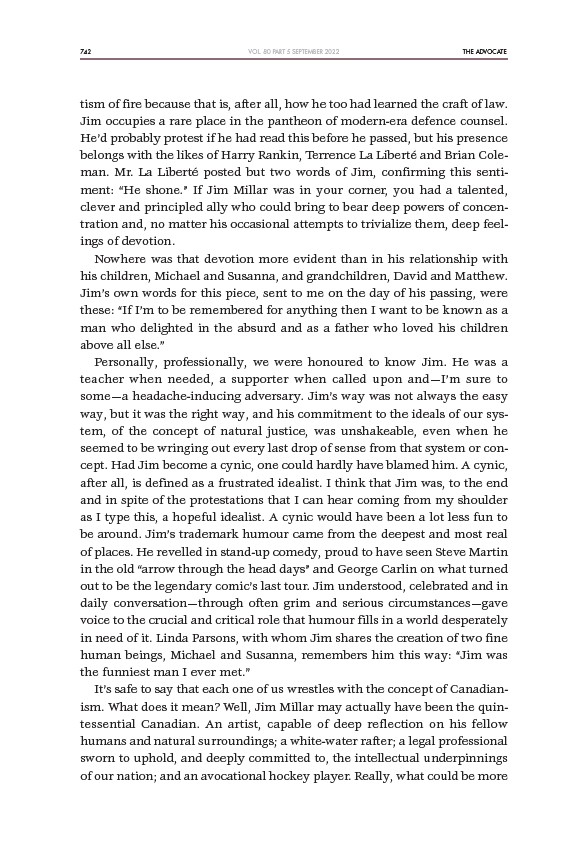
742 THE ADVOCATE
VOL. 80 PART 5 SEPTEMBER 2022
tism of fire because that is, after all, how he too had learned the craft of law.
Jim occupies a rare place in the pantheon of modern-era defence counsel.
He’d probably protest if he had read this before he passed, but his presence
belongs with the likes of Harry Rankin, Terrence La Liberté and Brian Coleman.
Mr. La Liberté posted but two words of Jim, confirming this sentiment:
“He shone.” If Jim Millar was in your corner, you had a talented,
clever and principled ally who could bring to bear deep powers of concentration
and, no matter his occasional attempts to trivialize them, deep feelings
of devotion.
Nowhere was that devotion more evident than in his relationship with
his children, Michael and Susanna, and grandchildren, David and Matthew.
Jim’s own words for this piece, sent to me on the day of his passing, were
these: “If I’m to be remembered for anything then I want to be known as a
man who delighted in the absurd and as a father who loved his children
above all else.”
Personally, professionally, we were honoured to know Jim. He was a
teacher when needed, a supporter when called upon and—I’m sure to
some—a headache-inducing adversary. Jim’s way was not always the easy
way, but it was the right way, and his commitment to the ideals of our system,
of the concept of natural justice, was unshakeable, even when he
seemed to be wringing out every last drop of sense from that system or concept.
Had Jim become a cynic, one could hardly have blamed him. A cynic,
after all, is defined as a frustrated idealist. I think that Jim was, to the end
and in spite of the protestations that I can hear coming from my shoulder
as I type this, a hopeful idealist. A cynic would have been a lot less fun to
be around. Jim’s trademark humour came from the deepest and most real
of places. He revelled in stand-up comedy, proud to have seen Steve Martin
in the old “arrow through the head days” and George Carlin on what turned
out to be the legendary comic’s last tour. Jim understood, celebrated and in
daily conversation—through often grim and serious circumstances—gave
voice to the crucial and critical role that humour fills in a world desperately
in need of it. Linda Parsons, with whom Jim shares the creation of two fine
human beings, Michael and Susanna, remembers him this way: “Jim was
the funniest man I ever met.”
It’s safe to say that each one of us wrestles with the concept of Canadianism.
What does it mean? Well, Jim Millar may actually have been the quintessential
Canadian. An artist, capable of deep reflection on his fellow
humans and natural surroundings; a white-water rafter; a legal professional
sworn to uphold, and deeply committed to, the intellectual underpinnings
of our nation; and an avocational hockey player. Really, what could be more